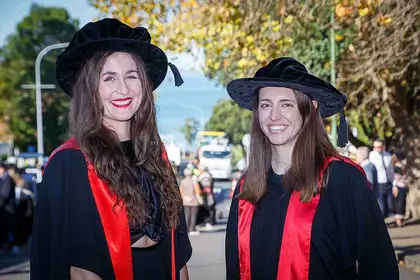
Dr Nikki Renall and Dr Sophie Kindleysides at graduation in Auckland this week.
Diet is one of the key drivers of the global obesity epidemic and New Zealand has one of the highest obesity rates in the OECD.
Doctoral graduates Nikki Renall, Taranaki, and Sophie Kindleysides both chose to research different aspects of this issue for their PhD studies and graduated in Auckland this week. Their findings relate to the same cohort of women from the PROMISE (PRedictors linking Obesity and gut MIcrobiomE) study, a research study run by the School of Sport, Exercise and Nutrition and supported by the Health Research Council of New Zealand.
Dr Nikki Renall
Based on the results from animal studies, the gut microbiota may play a role in this multifaceted disease, with habitual diet known to influence the composition of the gut microbiota in humans.
Dr Renall explored the association between the habitual diet of Pacific and New Zealand European women with different metabolic disease risk (high and moderate risk of obesity, respectively) and body fat profiles (normal and obese), in relation to the composition of their gut microbiota and metabolic disease risk.
Her research provides greater understanding of the association between habitual diet and characteristics of the microbiota, further highlighting that habitual diet, microbiota, and metabolic health associations are similar for a population of women with different metabolic disease risk and body fat profiles.
“In the context of obesity, my research provides greater understanding of the association between habitual diet and the gut microbiota. Whether the microbiota is a cause or consequence of metabolic health is not yet clear, however, my results suggest habitually consuming a diverse range of foods rich in dietary fibre is associated with distinct microbiota profiles, and lower metabolic disease risk.”
Dr Renall’s studies suggest that regularly consuming dietary fibre intake above the current dietary recommendations may reduce metabolic disease risk. Although, she adds, “Consideration needs to be given to the affordability of this as my study highlighted associations between socioeconomic inequity, diet quality and metabolic disease risk.”
The 32-year-old, originally from Waiuku, is currently a Postdoctoral Fellow at the Riddet Institute – a role supported by the High-Value Nutrition National Science Challenge. She works closely with Associate Professor Lisa Te Morenga from the Research Centre for Hauora and Health, and AuOra (part of Wakatū Incorporation). As well as her Doctor of Philosophy, Dr Renall also has a Diploma for Graduates endorsed in Psychology, a Master of Dietetics and a Bachelor of Science majoring in Human Nutrition, all from the University of Otago.
She says her research would not have been possible without the support and input of many people. “He aha te mea nui o te ao. He tāngata, he tāngata, he tāngata. What is the most important thing in the world? It is people, it is people, it is people. I would like to thank all of our research participants, the Health Research Council of New Zealand for funding the PROMISE study, to the study team for their support, friendship and willingness to share their expertise, to the Riddet Institute Centre of Research Excellence for supporting me with a PhD scholarship, and to my friends and whānau for their unwavering support, belief and aroha. Ngā mihi nui to all the people who contributed to my PhD journey.”

Dr Kindleysides with twins Emily (left) and Eliza.
Dr Sophie Kindleysides
The high level of dietary sugars and fats in the Western diet are key drivers of obesity. The sensory perception of taste and preference for sweetness, bitterness and fat drive the enjoyment of eating food which directly impacts metabolic health.
Dr Kindleysides investigated the sensory perception of taste in premenopausal women living in Auckland. The results showed that fat and sweet taste sensitivity and the increased hedonic liking of sweet taste were associated with increased weight, and further associated with metabolic health, dietary intake and disinhibited eating behaviour.
“The findings from my PhD suggest taste perception is a promising target for future weight loss and intervention strategies. It is tempting to think we can trick the brain into thinking it’s tasting something sweet while eating something bitter, to change unhealthy eating habits. However, individual taste preferences are also influenced by complex environmental, genetic and psychological factors, which means this is still an ongoing challenge that warrants further investigation.”
Dr Kindleysides, who also holds a Bachelor of Science majoring in Biological Sciences and a Master of Science in Food Science from Auckland University, held numerous tasting sessions throughout her studies. “I was amazed to hear the strong opinions and emotional feedback about taste and food preferences at each and every session. I felt like I was the best friend or worst enemy after asking our volunteers to try each mystery tasting sample. It was an unforgettable experience.
“I would like to share my heartfelt thanks to all the research participants in our study for their generosity in giving up their time. You are making such a huge contribution to research. I would also like to thank my family for their support during my PhD.”
The 36-year-old and her husband Daniel have twin girls, fifteen-month-old Emily and Eliza. She’s currently an associate editor at Springer Nature.